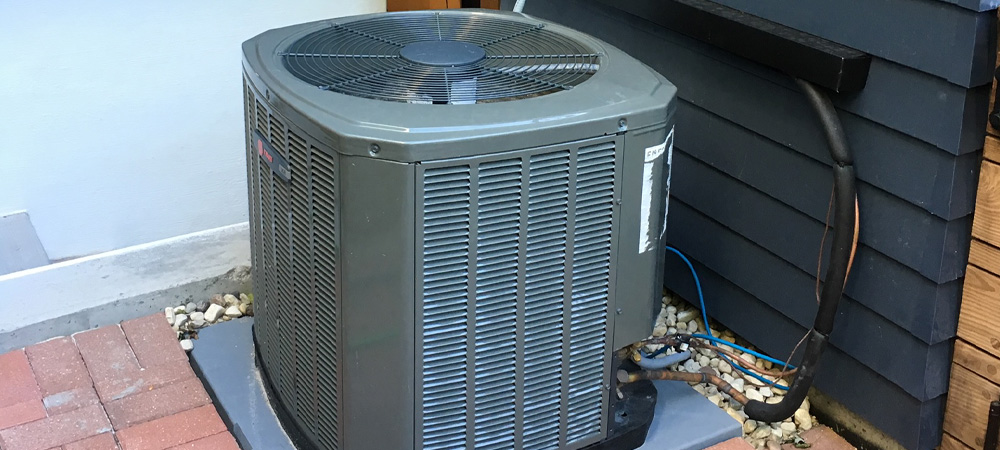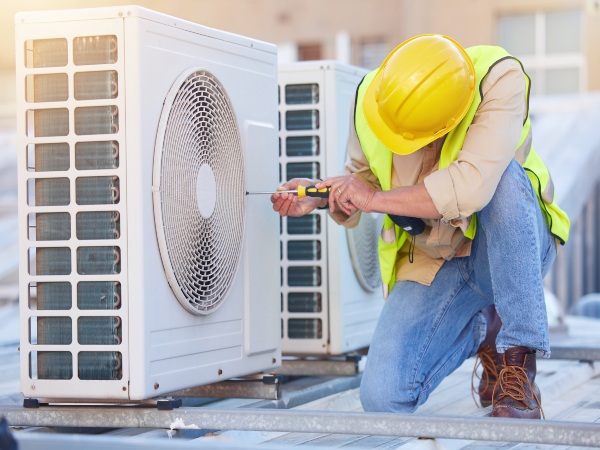See This Report about Ac Fixing
See This Report about Ac Fixing
Blog Article
Ac Dealing with: Repair Work The Cooling System To Bring Back Comfy Indoor Temperatures
Identifying Common A/c Unit Problems
Ever found yourself sweltering in the middle of a heatwave, only to recognize your ac system isn't cooling as it should? It's frustrating, but more typical than you might think. Lots of homeowners deal with these concerns annual, from weird noises to unequal air flow. However why does this take place?
Leading Concerns That Often Turn Up
- Refrigerant Leaks: When the cooling representative leakages, the AC has a hard time to chill the air, leaving you with hot blasts rather of revitalizing breezes.
- Frozen Evaporator Coils: Ever observed ice buildup? It's an indication the system's working overtime or airflow is blocked.
- Clogged Air Filters: Dust and particles can choke the system, causing it to labor harder and potentially overheat.
- Faulty Thermostat: Sometimes, the offender is as basic as a misreading thermostat, sending wrong signals to your system.
- Drainage Problems: Water pooling around the system? Blocked drainage lines might be the tricky bad guy here.
How to Acknowledge These Issues Early
Is your a/c making weird sounds-- a grinding or rattling? That's a red flag. Or has your electric expense inexplicably increased without a change in usage? Ineffectiveness often hides behind such hints.
| Sign | Possible Cause | Quick Repair Suggestion |
|---|---|---|
| Warm air blowing | Low refrigerant or compressor failure | Check refrigerant levels; call an expert for compressor problems |
| Unit won't turn on | Electrical problems or thermostat malfunction | Reset breaker; replace thermostat batteries |
| Water leakage | Blocked drain line | Clear drain with a wet/dry vacuum |
Why Do These Issues Occur?
Think of your AC as a fragile community. Interrupt one part, and the whole system stumbles. In some cases, it's disregard-- a forgotten filter change-- or external aspects like power rises. What's clear is that neglecting early signs only turns small glitches into significant headaches.

Essential Tools for AC Repair Work
Ever discovered yourself looking at a frozen evaporator coil or a persistent compressor that refuses to hum back to life? You'll rapidly realize that having the right tools isn't just a benefit-- it's a necessity. Envision attempting to evaluate refrigerant pressure with a worn-out gauge or patching a leakage without a correct vacuum pump. The aggravation is real, but the service lies in preparation.
Core Tools Every Technician Must Have
- Manifold Gauge Set: For accurate measurement of refrigerant pressures-- this is your diagnostic compass.
- Air pump: Getting rid of moisture and air from the system is important; skipping this action threats contamination.
- Multimeter: Electrical power streams calmly, however a multimeter speaks volumes about voltage, present, and continuity.
- Fin Comb: Bent fins on the condenser can choke air flow. This easy tool restores airflow effectiveness rapidly.
- Refrigerant Leak Detector: Pinpoint evasive leaks that might otherwise fly under the radar.
Pro Tips for Using Your Tools
- Never connect gauges without very first validating the system is off. It prevents damage to your instruments and safeguards your fingers.
- When utilizing the air pump, run it for a minimum of thirty minutes to ensure all moisture is drawn out-- shortcuts here result in system failure.
- Adjust your multimeter regularly; even slight mistakes can mislead fixing efforts.
- Use the fin comb carefully; excessive force can trigger more damage.
Air Conditioning Heating Repair Jacksonville FL
Air Conditioning Repair Jacksonville FL
Air Conditioning Installation Jacksonville FL
Air Conditioning Contractor Jacksonville FL
What's often neglected is how these tools interaction. A refrigerant leakage detector guides where to connect your manifold gauges to assess pressure drops accurately. Have you ever observed how a simple tool swap can shave hours off a repair task? That's the kind of efficiency every professional yearns for.
Step-by-Step Repair Recommendations for Your Air Conditioning Unit
Ever stood sweating while staring at a stubborn air conditioning unit that refuses to cool? The buzzing hum that all of a sudden turns into silence can be frustrating. How do you even begin to untangle this web of mechanical misdeed? Let's cut through the confusion with a clear, expert-guided procedure.
1. Detect the Core Problem
Before diving into repair work, ask: is the issue electrical, mechanical, or refrigerant-related? A fast test-- switch off the unit and inspect the circuit breaker. Tripped breakers often conceal the origin. Next, inspect the thermostat settings. Sometimes, the fix is as simple as recalibrating your thermostat or replacing its batteries.
2. Examine the Air Filter and Coils
A clogged filter or dirty coils can choke your a/c unit's effectiveness. Pull out the filter:
- If it looks grimy or dusty, switch it instantly.
- Utilize a vacuum or soft brush to clean up the evaporator coils gently.

Keep in mind, a neglected check here filter resembles trying to breathe through a scarf in a sauna-- ineffective and discouraging.
3. Take A Look At the Condensate Drain
Obstructed drains cause water buildup, activating sensor shutdowns. Use a stiff wire or a wet/dry vacuum to clear the drain line. This quick repair avoids leakages that can cause larger headaches.
4. Check the Capacitor and Fan Motor
These elements typically stop working quietly. Utilizing a multimeter, check the capacitor for voltage consistency. If readings change hugely or read absolutely no, replacement remains in order. For the fan motor, listen for grinding or irregular spinning-- signs of imminent failure.
Quick Reference Table: Common Symptoms and Repairs
| Sign | Probable Cause | Specialist Idea |
|---|---|---|
| AC not cooling | Dirty filter or low refrigerant | Clean filter first; look for leaks with soapy water |
| System won't begin | Tripped breaker or faulty capacitor | Reset breaker; test capacitor with multimeter |
| Water dripping inside | Blocked condensate drain | Clear drain line to prevent overflow |
Now, you might question, "Is it truly worth attempting to repair this myself?" Consider this: lots of repair work hinge on patience and the right tools instead of raw technical skill. A steady hand and a little troubleshooting can save hours and dollars. Similar to any complex maker, the key depend on comprehending its language-- the hums, clicks, and silences-- and responding appropriately.
Unlocking Longevity: Preventive Upkeep Tips for Air Conditioner Units
Ever seen how a whispering breeze can turn into a stifling heating system when your air conditioning unit fails? That subtle hum is often the first indication of hidden pressure. Overlooking these whispers can result in a total breakdown simply when you need cool relief one of the most. What if you could catch these early murmurs before they intensify?
Start with the filter. It's simple to overlook, yet a blocked filter chokes air flow, requiring your system to work overtime and spike energy usage. Changing or cleaning filters every one month throughout peak use isn't simply good practice; it's a lifesaver for your a/c's effectiveness.
Key Preventive Steps:
- Examine the coils: Dirt build-up on evaporator and condenser coils reduces heat absorption and release. A gentle brush or vacuum can restore their beautiful condition.
- Clear the condensate drain: Obstructions here can trigger water damage and increase indoor humidity. A basic wire or compressed air blast can keep this course clear.
- Examine refrigerant levels: Too low, and your air conditioning stress to cool; expensive, and it risks compressor damage. Only accredited technicians ought to manage refrigerant modifications.
- Check the thermostat's accuracy to prevent unnecessary cycling or discomfort.
Keep in mind the story of the old unit that froze solid one summer season? The offender was a small leak that sneaked past unnoticed. Little issues typically imitate normal wear but compound quickly. Staying ahead with routine inspections and seasonal tune-ups can avoid these concealed disturbances.
| Maintenance Job | Frequency | Effect |
|---|---|---|
| Filter Replacement | Every thirty days | Improves air flow and reduces strain |
| Coil Cleaning | Every year | Boosts heat exchange effectiveness |
| Drain pipes Clearing | Quarterly | Avoids water damage and mold growth |
| Refrigerant Check | Each year | Ensures optimal cooling efficiency |
Isn't it curious how the tiniest tweaks-- like tightening loose electrical connections or lubing moving parts-- can spin your AC back to peak type? These aren't just fixes; they're investments in comfort. After all, a well-maintained unit does not just cool; it whispers cool calmness, even in the most blistering heat.

A/c Repair Work Providers in Jacksonville, FL
Jacksonville, FL, is a vibrant city known for its extensive park system, gorgeous beaches, and dynamic cultural scene. As the most populous city in Florida, it offers a varied series of outdoor activities including fishing, boating, and exploring the Timucuan Ecological and Historic Preserve. The city's warm climate makes cooling a vital part of day-to-day convenience for citizens and services alike.
For those needing to repair a/c unit, Bold City Heating and Air offers expert consultation and advice. They are ready to assist ensure your cooling system runs efficiently through Jacksonville's hot seasons. Reach out to them for a free assessment to resolve your cooling repair work needs.
Report this page